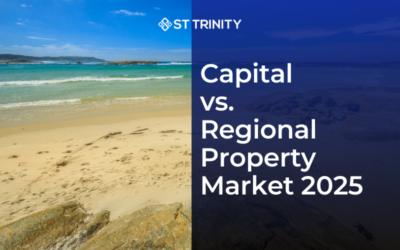For the last few years, the pandemic has put Australians’ physical, mental, and financial health to the test. Now that the dust has settled in 2023, Australian’s are looking for ways to recover—and investing in properties is one of the best ways to start the year fresh.
Before you start scouting for the next property to invest in, you’ll need to learn the lay of the land & property finance tips from the experts.
Table of Contents
Property Finance Update 2023
In 2023, property experts are cautiously optimistic that as interest rates plateau that stability will return to the market.
According to Forbes, house prices are expected to soften further in 2023 but falls may not be as severe as some expect if the RBA stops increasing rates before the cash rate reaches 4%.
Demand from overseas migration put pressure on the rental market this year, after borders that shut during the start of COVID reopened.
“As part of the budget, the Australian government has increased its quota for the permanent Migration Program to address the skills shortage gap – essentially the biggest immigration drive ever for Australia,” chief of research and economics at Domain, Nicola Powell, wrote in the wrap.
“This will boomerang back as an influx of people arrive from overseas and add additional demand to our housing market.”
As a result, first home buyers are likely to return to the market, buoyed by some of the first home buyer incentives currently available, then followed by investors.
What will the banks be closely looking at in 2023 loan approvals?

Image source: ABC News
As a home buyer or investor looking to buy in 2023, you should take a closer look at how certain factors regarding your financial health will affect your loan application.
The St Trinity Finance Team, discovered that these are the three financial health signals that will significantly affect your loan approval.
“In the coming year, banks are looking closely at your Debt to income ratios, Credit scores and credit reporting and your asset position,” said Jason Lin, Loan Consultant at St Trinity Property Group.
“This means they are looking at a client’s overall debt balances (as opposed to repayments), if they have sufficient assets to support higher debt positions and if they have missed repayments on any credit facility.”
Let’s break this down a bit further!
Debt-to-income ratio
Also known as the DTI, your Debt-To-Income ratio is the percentage of your gross monthly income (income before taxes) that goes towards your monthly debt repayments.
HOW TO CALCULATE YOUR DEBT-TO-INCOME RATIO?
Here is an example of how you can compute your Debt-To-Income ratio:
- Gross Income: $7,000
- Car Loan: $550
- Mortgage: 1,200
- Credit Card: $450
Your monthly debt repayment is $2200.
To get your DTI ratio, divide your Debt by your Gross Income.
2,200 / 7,000 = 0.31
That means your Debt-To-Income ratio is at 31% or 3.1
WHAT IS A GOOD DEBT-TO-INCOME RATIO?
To give you a clearer picture of the status of your DTI ratio, here are some of the acceptable scores from some of the biggest banks in Australia:
Credit scores and credit reporting
It’s easy to confuse both terms, but they are not the same — only related.
Your credit report summarises all key information regarding your credit activity (i.e., spending) and your current credit situation. Then using all the information stated in your credit report, the bank or lender will evaluate your credit score.
Asset position
Banks will be closely looking at your overall debt balances instead of repayments. Before a bank approves your property financing application, they will want to see if you have sufficient assets to support higher debt positions, and if you have missed repayments on any credit facility.
How will the most recent RBA update affect my loan approval?
Earlier this month, the RBA announced their first Cash Rate Update of 2023. Just as expected, the RBA hiked the official cash rate by 25 basis points to 3.35 per cent, the highest level in almost 11 years.
What does this mean for the property market as a whole and to property investors?
The idea is that it’s been very normal for us to assume that dropping interest rates has a direct correlation with increasing prices because that is all we’ve ever seen during the pre-covid period.
However, when we look at the historical data for the last 52 years, we see exactly the opposite, according to Will Wehbe, Sales Director at St Trinity Property Group.
In fact, interest rates are always used as a measure to control inflation, and are not the only factor influencing housing prices.
“Inflation is how much it costs us for assets, and houses are one the the most important assets that we own. So as the interest rates start to rise, it’s actually a way to try to control the costs of these assets,” said Mr Wehbe.
“It doesn’t actually change how much we think properties are worth, it only changes how much money we get from banks.”
This means interest rate rises don’t indicate that the demand for properties is decreasing. It only means that property buyers can’t afford to take large mortgages from the banks, so they start to look at alternative ways to buy property. It can be to buy in a more affordable sector or move to areas that are slightly further away.
Sharing the same thoughts, Dr Powells says “strategic investors” will come into the market, who are not concerned about buying in a downturn, purchasing for tax purposes or for a long-term hold.
“It is time spent in the market that counts, not timing.”
Top 6 financial tips to help you prepare buy a property in 2023

Prepare a budget
Take a look at your finances and see how much you can afford to spend on a property investment. If you plan to apply for property financing through a bank, make sure that your gross income can handle another debt load.
Minimise unnecessary debts
Having large credit card limits with nil balances as a ‘safety net’ will not help you in this situation. Since those will still affect your debt position and debt-to-income ratios even if you don’t use them, try to cut down on unnecessary debts in the meantime. You can also try minimising your amount of cards, or reducing the credit limits to a reasonable amount.
Tell the bank immediately if you miss a repayment
We’re all humans, so don’t panic if you ever miss a repayment deadline! All you have to do is contact your bank as soon as possible. You can immediately repay your balance or ask for an arrangement.
The bank will give you a short grace period before it hits your credit report. But if you still miss your deadline, it will reflect on your report for 2 years. This policy applies to all facilities, including credit cards. And also, be careful not to get caught by your credit card’s annual fee.
Re-evaluate your liabilities
Having more liabilities than assets, (i.e. unsecured loans, credit cards etc.) can negatively affect your ability to apply for a home loan. Banks will evaluate your asset position and see if it outweighs your debt position.
Owning a property can significantly balance someone’s asset position, so this issue mostly lies with first home buyers.
Be on the lookout for the best markets
It’s a good idea to keep an eye on current trends and actively explore the best markets if you plan to buy a property in 2023.
According to property experts, affordability constraints, combined with the perceived value units offer and the high demand from renters are all helping to steer buyer demand towards units. This is opening a window of opportunity for long-term property investors and homebuyers.
Talk to an expert
If you need more help on how to apply for a property finance loan and where to find the best residential and commercial properties to invest in, our team of property experts will be happy to assist you. Book a quick call with us below!




